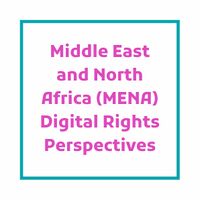Middle East and North Africa (MENA) Digital Rights Perspectives

- Who: Islam Al Khatib
- Date: Wednesday, June 7
- Time: 9am EDT / 1pm UTC (What time is it in my city?)
- Language: English
- Location: Zoom
RSVP: https://digitalrights.formstack.com/forms/perspectivesfromthesouth
Middle East and North Africa (MENA) Digital Rights perspectives with Islam Al Khatib
In this session we will talk about digital rights in MENA, its perspectives and cases during 2022-2023. The main topics will be:
- Increased campaigns and conversations on digital justice in the region from different contexts (highlighting different campaigns, projects, reports by community members).
- Further state attempts across borders to control flow of information (violations of data privacy, apps that attempted data extraction, digital surveillance, smearing, COP27 in Egypt as an example).
- Community conversations about infrastructure and accessibility (challenges of remote work, financial crises and challenges).
- Wellbeing, burnout, and a collective need for better working conditions (consistent campaigning has lead to severe burnout, examples of crises and catastrophes that has deeply impacted the work of DRDs).
Speaker:
Islam Al Khatib is our MENA Community Lead at Team CommUNITY. She is a Palestinian refugee feminist researcher born and raised in Beirut. Her work focuses on the methods and the processes with which we produce knowledge.
Notes & Resources
Slides & Resources
Slides
MENA Digital Rights Perspectives from the South Presentation
Resources
- Resources and Actions to Support Sudan: Find out ways that you can support those in Sudan. We have created a list of initiatives and resources, verified by trusted community members, ranging from organizations doing security and relocation to fundraisers and mental health resources.
- June 8: The notes from the Glitter Meetup focused on community solidarity with Sudan
- Article on Meta and the censorship of Palestinian voices
- April 27: The notes from the MENA Regional Meetup with ELSC's Laila
- June 15: The notes from the GM Abolitionist Creativity - Seizing Knowledge Production in Solidarity with Palestine
- https://armlebanon.org/
- https://genderiyya.xyz/
Q&A Section
The future of the region
I have a negative view. The region is in an uncertain place and it comes from the reshaping of borders, economical clashes. Regarding the tech, everything is tuyrning to headquarters of big companies, the investments are going there and everything is going to be tested with people like us.
We need ways of protection from this. There is no actual accessibility to information written in other languages than English. We will have more isolation, not public spaces, public knowledge and owning our own data.
I was wondering how you have been connecting with and learning with other regions and how you want to use/share/publlish information/data you are collating?
I could have done more. There are similarities between different contexts. Our LATAM Community leads speaks and a lot of things resonate with me. It is hard to make the link without projecting from my context but I see the connection. When I interview people, I send them links to briefs of other regions to see if they do the same connections I do, so I don't put myself in but the vision is there.
Do you know of any solutions to the internet cost problem that is easy for donors to sponsor remotely?
The constant buying of data packages do not present a solution from the organizations. We can compensate but they aren't safe while working. There is no infrastructure and even you have the package, it is insuficient and we don't have a simple solution.
In your experience, what are the human centred tech tools and human centred developments that do you see in the region?
Enterpreneurships being bought by governments, like tools for public schools, specially for refugees. I think about how to keeping track of these tools but it's really hard. There are new researches across the region on developments, like security studies, warfare and AI but the scary part is that this is directlty linked to the governmental financial support.
https://www.linkedin.com/company/beirut-digital-district
What are the main challenges to platform workers organizing (unions and beyond) for their labor rights in the region?
I can't think of the region generally. I can think of the context of content moderators and how companies are relocating. The right to work is not the same for everyone so these moves could be harmful for the more oppressed ones. For Lebanon and Fairwork, it is a great oppotunity but it will be very difficult to organize and get a job there for a lot of migrant groups.
What are the main challenges of initiatives truing to work on archiving from a feminist perspectives?
I have been noticing that everyone is very scared of loosing their work and knowledge, since they are forced remotely. There are so many challenges mostly linked to what type of resources are archived, who has access and how licensing is working, and even how do we feel about things that we think that are already archived. There are a lot of life skills like what tool and technicalities that are not existing or is hard to learn about.